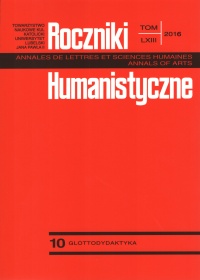The Perspective on Learner Autonomy in Real Teacher’s Practices in the Context of Higher Primary Polish EFL Education
Abstract
In the past 30 years there has been a marked interest in learner autonomy in the context of Polish education. Changing roles of the teacher and learners in the classroom and particularly in the EFL classroom, cognitive method, communicative approach to language teaching as well as a few unconventional methods of teaching foreign languages motivated Polish teachers and language educators to produce empirical as well as theoretical papers devoted to autonomy.
The aim of this paper is to present the perspective on learner autonomy in Polish EFL classroom and demonstrate the potential difficulties why autonomy is still a taboo issue in Polish education despite clear ministerial requirements in the core curriculum of general education.
This paper is supported by the empirical study devoted to learner autonomy in a Polish higher primary foreign language classroom, which encompassed long-term classroom observations as well as the interviews with the learners and the teachers, who were also asked to fill in an extensive questionnaire. The respondents were over a hundred language learners at the age of 11, 12 and 13 and four female English teachers with varied experience in foreign language teaching.
This paper concentrates on the results from the first phase of the study (class observations) as well as the outcomes of the interviews with the teachers and the questionnaires they filled in. This part of the study demonstrates the teachers’ views and attitude towards autonomous learning in Polish state schools and verifies their methodology in a real classroom setting.
References
Benson P. (1997), The philosophy and politics of learner autonomy, [in:] P. Benson and P. Voller (Eds.), Autonomy and independence in language learning, London: Longman,18-34.
Benson P. (2006), Autonomy in language teaching and learning, Language Teaching, 40. UK: Cambridge University Press, 21-40.
Borg S. and Al-Busaidi S. (2012), Learner autonomy: English language teachers’ beliefs and practices. ELT Research Paper 12–07, London: British Council.
Chudak S. (2007), Lernerautonomie fördernde Inhalte in ausgewählten Lehrwerken DaF für Erwachsene: Überlegungen zur Gestaltung und zur Evaluation von Lehr- und Lernmaterialien, Frankfurt am Main: Peter Lang.
Dickinson L. (1992), Learner autonomy 2: Learner training for language learning, Dublin: Authentik.
Harmer J. (1991), The practice of English language teaching, London–New York: Longman.
Holec H. (1981), Autonomy in foreign language learning, Oxford: Pergamon.
Jezierska B. (2003), Autonomia, [in:] T. Pilch (Ed.), Encyklopedia Pedagogiczna XXI w., Warszawa: Wydawnictwo Akademickie „Żak”, 243-245.
Komorowska H. (1978), Sukces i niepowodzenie w nauce języka obcego, Warszawa: Wydawnictwo szkolne i pedagogiczne.
Komorowska H. (2002), Metodyka nauczania języków obcych, Warszawa: Fraszka Edukacyjna.
Michońska-Stadnik A. (1996), Strategie uczenia się i autonomia ucznia w warunkach szkolnych, Wrocław: Wydawnictwo Uniwersytetu Wrocławskiego.
Michońska-Stadnik A. (2004), Autonomia ucznia 400 lat po Galileuszu, czyli szansa dla Odpowiedzialnych, [in:] Pawlak, M. (Ed.), Autonomia w nauce języka obcego, Poznań–Kalisz: Wydawnictwo Wydziału Pedagogiczno-Artystycznego UAM w Kaliszu, 11-18.
Orchowska I. (2006), Kompetencja interkulturowa w sytuacji interpretacji autentycznego dokumentu ikonograficznego w języku/kulturze obcej na poziomie B2, [in:] Jodłowiec M. and Niżegorodcew A. (Eds.), Język a komunikacja 22, Kraków: Tertium, 248-260.
Pawlak M. (Ed.) (2004), Autonomia w nauce języka obcego, Poznań–Kalisz: Wydawnictwo Wydziału Pedagogiczno-Artystycznego UAM w Kaliszu.
Scrivener J. (1994), Learning teaching, Oxford: Heinemann English Language Teaching.
Taylor J. (2002), The road to autonomy, English Teaching Professional 24, 9-10.
Wilczyńska W. (1999), Uczyć się by być nauczanym? O autonomii w przyswajaniu języka obcego. Warszawa–Poznań: Wydawnictwo Naukowe PWN.
Wilczyńska W. (2004), Dydaktyka krocząca, czyli jak organizować dydaktykę w półautonomii (PA), [in:] Pawlak, M. (Ed.), Autonomia w nauce języka obcego, Poznań–Kalisz: Wydawnictwo Wydziału Pedagogiczno-Artystycznego UAM w Kaliszu, 44-56.
Wysocka M. (2003), Profesjonalizm w nauczaniu języków obcych, Katowice: Wydawnictwo Uniwersytetu Śląskiego.
Zawadzka E. (2004), Nauczyciele języków obcych w dobie przemian, Kraków: Impuls.
Copyright (c) 2016 Roczniki Humanistyczne

This work is licensed under a Creative Commons Attribution-NonCommercial-NoDerivatives 4.0 International License.





